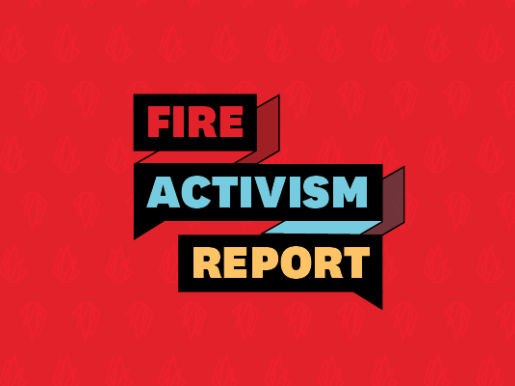Table of Contents
FIRE Activism Report

Tell us about your activism!
You’re doing amazing things on your campus to promote and protect free speech and we want to hear about it! Complete FIRE’s Activism Report to tell us about your efforts to make your campus more free speech friendly.
Why should you fill out the form?
It’s simple – so we can celebrate you and share your success! To sweeten the deal, eligible activism will earn you some awesome FIRE swag! All you have to do is tell us about the fantastic work you do on your campus using your .edu email address.
Who should fill out the form?
Any current university student in the U.S. working to advance and protect the First Amendment on their campus.
What types of things do we consider activism?
Activism efforts can look very different from campus to campus. Did you write an op-ed in your student newspaper defending student rights? Or maybe, you hosted a forum to have civil discussion about a difficult topic? Perhaps, you’ve gone all out and worked with your administration to adopt the Chicago Statement on your campus! Whatever it is, we want to know about it because students like you are on the front lines of advocating for the First Amendment. Below, you’ll find some more examples to help you get started.
What do I need to do?
Fill out this short form outlining your efforts, the outcome(s), and include any photographs, links, articles, etc. resulting from your work. While each activism initiative will have its own goals and outcomes, this is a list of some specific categories that we may take into account when deciding on eligibility for FIRE swag:
- The number of actions completed
- The impact made on campus and the community
- Creativity in the execution of the initiative
- The amount of communication and work done with diverse coalitions on campus
- The specific description of the activism efforts
- Alignment with FIRE’s mission
Are you ready to get started? Great! For more advice about First Amendment activism, as well as some sample activities to help you think about creative and fun ways to get your peers involved, check out FIRE’s Activism Toolkits.
Here are a few additional suggestions to help in your activism brainstorming:
Read FIRE’s Guides.
FIRE has published a series of concise and easy-to-understand guides on free speech and due process issues on campus. You can request copies of FIRE’s Guides or read them online to learn more about civil liberties at America’s colleges and universities.
Host a FIRE speaker.
Invite a FIRE staffer to speak at your school to discuss free speech or due process issues on your campus. Alternatively, think about bringing politically diverse speakers to campus so that your campus community will have the opportunity to hear from a variety of perspectives.
Work with administrators to enact policy reform.
Far too many colleges across the country fail to live up to their free speech obligations in policy and in practice. Being aware of these problematic policies is the first step toward changing them and spreading awareness about them on your campus.
Have you worked with your campus administration to change your campus’ policies from red to yellow? Or yellow to green? Let us know!
Write an op-ed.
By voicing your opinions on any issue, you can ignite discussion on your campus and flex your free speech muscles. Check out our tips for advice on how to submit your op-ed to a campus newspaper or professional publication.
Start a Student Defenders group.
Campus student defenders groups promote fairness in campus disciplinary proceedings, protect due process, and advise students on their rights. FIRE’s Student Defenders program works with students to protect due process on college campuses.
Reach out to Margaux, margaux.granath@thefire.org, if you are interested in starting a Student Defenders group on your own campus!
Start a Let’s Talk group.
FIRE’s Let’s Talk program provides students with the tools to work towards a more intellectually tolerant campus environment. Let’s Talk groups aim to create spaces on your college and university campuses for healthy and productive conversations.
If this interests you and you’d like to speak to a FIRE staffer for advice about how to get a Let’s Talk group started on your campus, please reach out to Elizabeth Stanley at elizabeth.stanley@thefire.org.
Host a “free speech zone” stakeout or on-campus protest.
One tried and true way to make your voice heard on campus is to lead or take part in a protest. Time and again, college campus protests have led the charge for social change. Check out FIRE’s FAQ For Student Protests on Campus to learn more about your rights when participating in a protest.
Present to your student government.
Adopt the Chicago Statement.
Has your school endorsed or adopted the Chicago Statement? You can write a letter to your administration to encourage your institution to solidify their commitments to free expression for all students and faculty.
Host an event.
Events are a great way to educate your campus community about the importance of free speech and due process rights on campus or call attention to and gather support for any cause.

